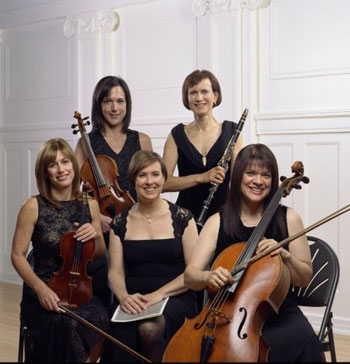Orion Ensemble closes season with a bracing Latin-flavored program

Cinco de Mayo is as good a reason as any to explore the rich world of chamber music by Mexican composers or composers influenced by Latin American rhythms and harmonies.
The ever-inventive Orion Ensemble is closing its 20th anniversary season with a set of concerts honoring the holiday. Heard Wednesday night in Roosevelt University’s Ganz Hall, the program opened with the zesty Zarabandeo for clarinet and piano by contemporary Mexican composer Arturo Marquez followed by Trio Romantico, an expansive, four-movement work for violin, cello and piano by Manuel Ponce, composed in 1911.
The evening also included a short piece commissioned for Orion’s 20th season: Lost Souls by Chicago-born jazz pianist and composer Miguel de la Cerna. Last on the program was Brahms’ fiery G Minor Piano Quartet, Op. 25, a fitting finale for a concert fill with colorful, tuneful music.
The Orion Ensemble—Kathryne Pirtle, clarinet; Florentina Ramniceanu, violin; Judy Stone, cello and pianist Diana Schmuck—is one of Chicago’s chamber music treasures. Not only do their performances crackle with the kind of electricity born of musicians who listen and respond acutely to one another. They also explore far corners of the repertoire. Over the years Orion has never hesitated to mix it up in programs that might range from Mozart to William Bolcom or Chick Corea. Their choices are always thoughtful and we never feel that they play unfamiliar pieces merely for the sake of novelty.
And so it was Wednesday night. Composed in 1995, Zarabandeo grew out of Marquez’s fascination with danzon, a distinctive type of lively yet sultry Cuban dance. Pirtle and Schmuck threw themselves into the piece from the opening bars, Pirtle’s big clarinet tone filling the hall with crisp, clean melodies while Schmuck’s crunchy piano chords marched brightly underneath. When the music melted into lazy jazz rhythms, their high-energy playing slowed seamlessly into more relaxed, smoky realms.
Ponce (1882-1948) deliberately ranged all over the stylistic map in his Trio Romantico. He studied in Europe, and his trio shifts from lush Romanticism to extended folk-flavored sections. In the opening movement, the dark, velvety tone of Ramniceanu’s violin and Stone’s cello was a lustrous match for Schmuck’s somber piano. But at times Ponce’s inspiration flagged and the piece lost momentum despite the performers’ best efforts.
De la Cerna’s Lost Souls, inspired by Columbus’ travels in 1492, evoked the fate of the Native Americans eventually displaced by white settlers. Scored for clarinet, violin, viola and piano, it was a short but deep portrait of an unsuspecting people overwhelmed by uncontrollable forces. Guest violist Stephen Boe added a powerful voice to the chilling moments when single notes from each instrument hung in the air like low, oppressive clouds. Moments of frenzy were sharp-edged and jumpy, but we never lost the sense that they were propelled by something massive and unstoppable.
In the faster movements of Brahms’ mighty quartet for piano, violin, viola and piano, the Orion played with controlled ferocity. The Andante sounded overly deliberate, however, lacking the ardor of wind-swept lyricism. But the Hungarian-flavored finale overflowed with saucy syncopations and hellbent-for-leather speed.
The program will be repeated 7:30 p.m. Sunday at the Music Institute of Chicago in Evanston. orionensemble.org; 630-628-9591.
Posted in Uncategorized

